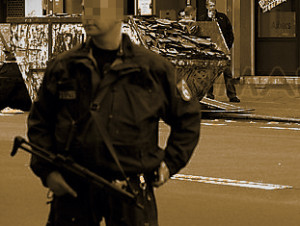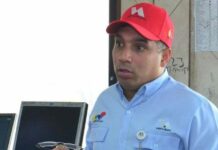By Carlos Tablante
 The Venezuelan government uses criminal gangs to ensure political and social control of the protests. While criminalizing protesters and ignoring the opposition, the government dialogues with delinquents.
The Venezuelan government uses criminal gangs to ensure political and social control of the protests. While criminalizing protesters and ignoring the opposition, the government dialogues with delinquents.
In recent days, journalist Olga Maribel Navas told UN Radio the shocking experienced that she witnessed when attending a meeting held between with representatives of the chavista regime with a dangerous gang operating in the Eastern Freeway.
In recent days, the journalist Olga Maribel Navas UNRadio recounted in vivid shocking experience for her to attend a meeting between representatives of the regime and a gang operating in the Eastern Freeway. In this link you can listen to the story (in Spanish) that she told UN Radio, which reflects, as she puts it, «the tremendous problem that Venezuelans have gotten into”:http://unradio.
This story confirms what I said in Washington DC on February 11, 2014, during the presentation to the press of my book “Estado delincuente”: President Nicolás Maduro is imposing a pact to cohabit with criminals in Venezuela.
As of February 12, 2014, president Nicolás Maduro launched a brutal crackdown, judicializing politics, persecuting and imprisoning dissidents and all those who think differently and democratically express their rejection of the regime’s policy. As thousands of students and social and political leaders are under rigged lawsuits and others have gone to jail for arbitrary decisions and in violation of their human rights, the chavista establishment that misgoverns Venezuela is negotiating secret agreements with more than 12,000 gangs operating in the country, gangs that are dealing with drugs, kidnapping, extorting and murdering Venezuelans.
In 2014 there were 25,700 homicides in Venezuela, making ours the most violent country in the world.
As witnessed by the above-mentioned journalist, criminals currently negotiating with José Vicente Rangel Ávalos, Deputy Minister, Domestic Policy and Legal Security, are complaining that the government persecutes them and not the boliburgeois, which have robbed the state billions of dollars with the complicity of senior government officials, of which hardly anyone speaks. A clear illustration of this is the tremendous financial loss for the Venezuelan state that caused the financial crisis in 2009-2011 (pseudo-bankers responsible for causing this crises are all free and the government is even returning their «goods» to some) and the arbitrary allocation of more than US$ 20 billion from Cadivi to shell companies to undertake fictitious imports. The presidential commission responsible for investigating this case has not yet presented its report, nor has it published a list of the shell companies involved in the macro-scam, a practice called «cadivismo» by the very Nicolás Maduro.
We are facing a set of corruption networks that encourage impunity and replace the rule of law by a criminal state.
This criminal state that moves in the shadows and make secret deals with highly dangerous criminals behind Venezuelans’ backs, is the same that makes fun of dialogue, that imprisons young people, arbitrarily removes immunity to MPs from the opposition, keeps majors Enzo Scarano and Daniel Ceballos illegally and unfairly detained, and treats cruelly Leopoldo López, who remains in the Ramo Verde prison isolated from friends and fellows from his party, often unable to even receiving family visits. Our right to life, stablished in Article 55 of the Venezuelan Constitution, is attacked from multiple sides: on the one hand, by corrupt officials and their boliburgois accomplices that steal from the state and generate shortages of food and medicine, lousy public services, hyperinflation, business closures and unemployment. On the other hand, there are the criminal gangs with which government secretly negotiates and that are responsible for, among other violent crimes, murdering an average of three Venezuelans every hour.
Here is the question: Why is the government of Nicolás Maduro engaging in negotiations with such powerful criminal gangs? Based on the violent nature of these gangs that terrorize neighbours and students during protests and kill trade unionists (for further reference, read my book The Criminal State: Organized crime in Venezuela) and judging by the shameful Gordo (fat) Bayón episode, it appears that the sole purpose of those negotiations is to politically and socially control popular protests (be it from students, neighbours or employees) in exchange for impunity.












